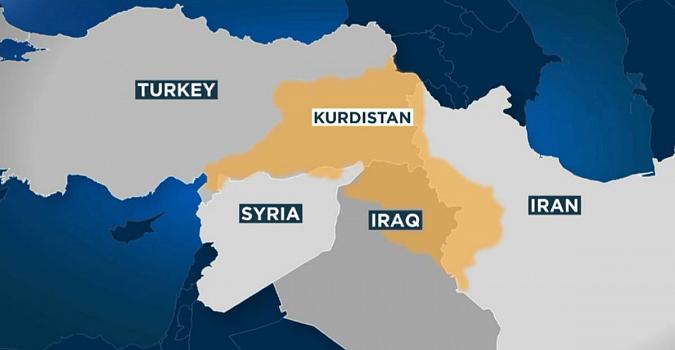What is the issue?
- With the conflict with the Islamic State (IS) almost concluded, Turkey has made a decisive move against Kurdish fighters on the border with Syria.
- As most international players have been pulling out of Syria, the Syrian Kurds will have only themselves to fed for this time.
Who are the Kurds?
- Kurds are an ethnic-linguistic group that inhabit the middle-east and are spread across the border regions of four countries.
- Their demands have varied from wanting a separate country for themselves to demanding greater autonomy within the framework of the existing states.

- During the conflict with the IS in Iraq and Syria in the past three years, the military wing of the Syrian Kurds (SDF) was supported by the USA.
- In 2017, Iraqi Kurds attempted to declare independence, but were curtailed by Iraqi army’s intervention into the Kurdish autonomous region.
- Currently, Syrian Kurds seem to be on a similar pursuit along the Syria-Turkey border, which has got Turkey worried.
How did they act in the operations against IS?
- The “Syrian Democratic Force (SDF)” was created in 2015 by the various Syrian Kurdish political forces.
- U.S. Alliance - Various strategic considerations saw the U.S. coordinating with SDF to secure ground support for its operations against IS in north Syria.
- SDF with air support from the U.S., routed the IS from Raqqa in October 2017.
- Subsequently, the Kurdish leadership asked Raqqa’s people to join the Kurdish-run state of “Democratic Federation of Northern Syria (Rojava)”.
- Notably, “Rojava” means “Western Kurdistan” and was perceived as a symbolic assertion of the future Kurdish ambitions of a greater Kurdish state.
- Turkey’s Concern - In order to confront the IS, SDF allied with other minority groups like Assyrians and the region’s major Sunni tribe Shammars.
- But as the Kurdish militia “People’s Protection Units (YPG)” was the dominant entity in SDF, Turkey primarily saw it as a Kurdish resurrection movement.
- Hence, Turkey had ideologically opposed it from the start and had for long been threatening to enter Syria with an armed offensive against SDF.
- But despite the grumbling, the U.S. pressure and the primacy of finishing the IS had effectively dettered action.
What is the current operation?
- Recently, with the IS wiped out, Turkish President Erdogan announced the start of Turkish armed operations against the Kurds across the Syria border.
- This will bring SDP in directly in war with Turkey, which is a mere extension of the already ongoing war against the Kurds within Turkey’s southern provinces.
- Notably, Turkey is vehemently opposed to any form of ethnic Kurdish assertion, and has even declared “Kurdish Workers’ Party (PKK)” as terrorists.
- Within Trukey, most Kurdish towns are under eternal curfew and almost all Kurdish political parties are effectively banned.
How has the international reactions been?
- With the threat of IS no more, international interests seems to be vanining in the region and regional powers are becoming assertive again.
- Indications are also clear that Mr. Erdogan had sought assurances from all the major players in northern Syria before he sent in his troops.
- The U.S. seems to have cut off links with its Syrian Kurdish allies and has stated its intentions of not wanting to stay in norther Syria for long.
- The Russians too seemed to have withdrawn as the Russian backed “Syrian Arab Army”, gave assurances that it would not contest the Turkish invasion.
- Hence, as Turkey invades into Kurd controlled Syria, the SDP and the Syrian Kurds have only themselves to fend for.
How is battle unfolding?
- Turkish tanks have moved swiftly through Afrin’s Shera and Sherawa districts, with YPG and YPJ fighters trying their best to hold off the ground assault.
- Turkey’s domination of air is giving its ground forces a decisive advantage and with continued bombing of SDF positions, the Kurds don’t stand a chance.
- Significantly, at this juncture, there is nobody who will be willing to go to the United Nations to ask Turkey to call off its war.
Source: The Hindu
